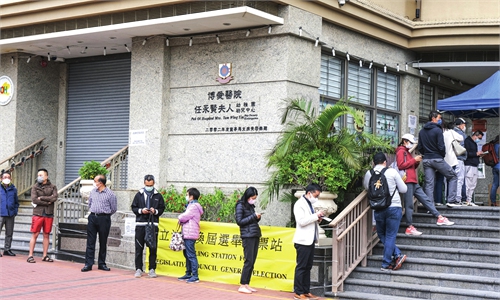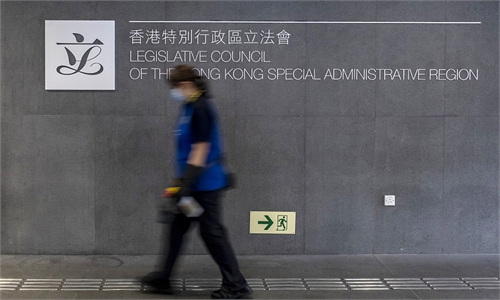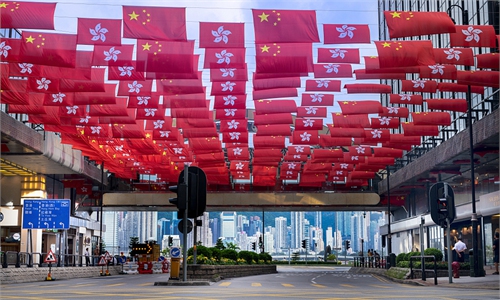All 90 members of HKSAR's 7th-term LegCo elected, ushering in effective governance with patriots-only principle
New electoral system proves reliable, 'boosts confidence in future elections'
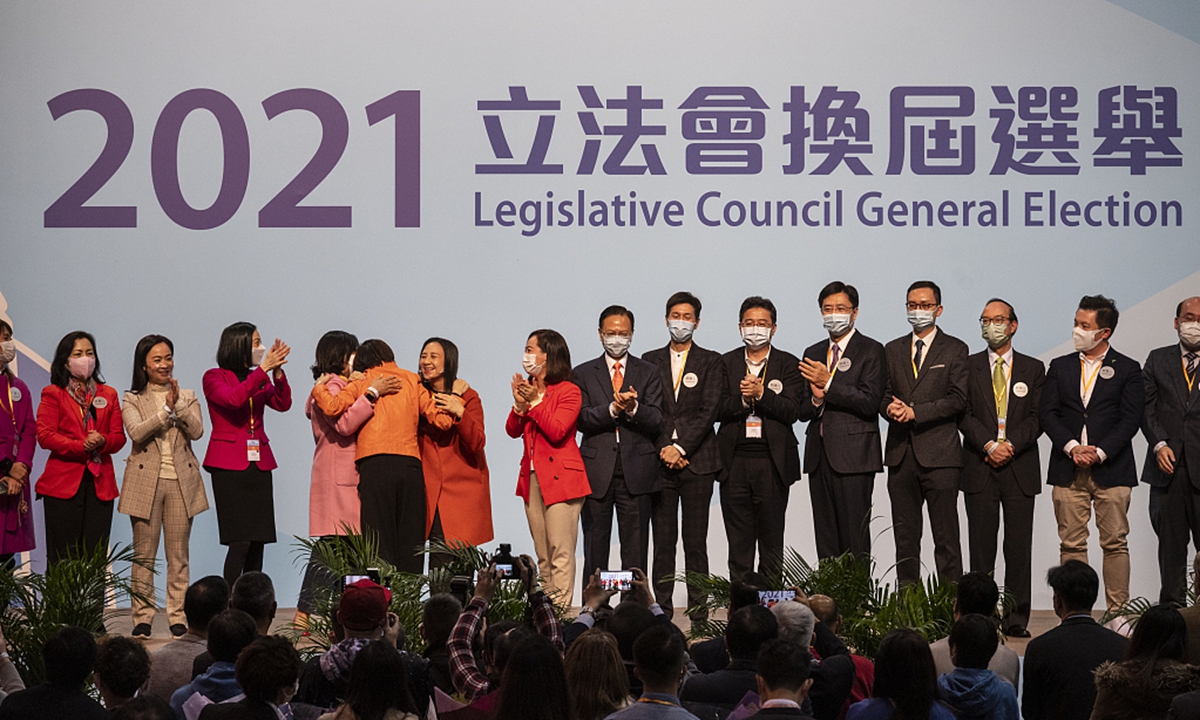
Winner candidates celebrate on stage their success following the Legislative Council election in Hong Kong on December 19, 2021. Photo: VCG
All the 90 members of the 7th-term Legislative Council of the Hong Kong Special Administrative Region (HKSAR) were elected on Monday. They were elected by the Election Committee constituency (40 seats), functional constituencies (30 seats), and geographical constituencies (20 seats) after over 1.35 million Hong Kong residents voted on Sunday.Some former lawmakers including Priscilla Leung Mei-fun and Junius Kwan-yiu Ho were elected from the Election Committee constituencies. The 7th LegCo, which will start on January 12, 2022, will have some new faces, such as Tang Fei, vice-chairman of Hong Kong Federation of Education Workers, Nixie Lam, a member of the All-China Youth Federation and newly elected Election Committee member, and Wendy Hong, one of the "new Hongkongers" who took part for the first time in these elections.
The liaison office of the central government in Hong Kong released a statement on Monday congratulating Hong Kong on successfully holding the LegCo election. The office said the election underscores the progress and advantages of the new electoral system, which is also a successful practice of democracy with Hong Kong characteristics.
153 candidates competed with different ideas, contributions and responsibilities, underscoring the patriotic sentiment and capacity of taking part in local governance, the liaison office said. Hong Kong also shook off yearlong election chaos, bidding farewell to vicious confrontations and rivalry and showcasing a rational election culture. This also formed a successful example for quality democracy, the office noted.
At the time of the election, some countries like the US and the UK held the so-called democracy summit and issued a six-month report on Hong Kong to support the anti-China rioters in an attempt to continue disturbing Hong Kong, the liaison office said. "Those ill-intentioned performances will only prove that there are external forces interfering in Hong Kong affairs, proving that anti-China rioters are culprits who disrupt the city's democratic development," it said.
The Commissioner of the Chinese Foreign Ministry in Hong Kong also praised the new electoral reform, which unveiled a new page in Hong Kong's "colorful democratic characteristics." It said in a statement issued on Monday that the principle of only patriots governing Hong Kong is not a "mono soundtrack," but lawmakers with different backgrounds and stances who can participate in governance in an effective way.
Some elected lawmakers also voiced their hope for the new LegCo, which will no longer be a place engaging in meaningless political battles and abusing filibustering tactics to paralyze local governance but a platform to bring attention to real issues to improve the city's economic development and social livelihood.
"It's been a very busy few weeks with all the meetings and what I should call learning sessions. Every meeting opens a new door to a new set of issues that awaits being fixed. We run based on regional constituency where we rarely see issues from an industry angle. Being a newly elected legislator in the election committee constituency gives me the opportunity to look at issues from a more holistic view," Nixie Lam told the Global Times after she was elected.
"There's still a lot I will have to learn from these industry stakeholders. I have a lot of work to do but I'm up to the responsibility and challenges," she said.
While there was only one non-pro-establishment candidate elected as lawmaker for the 7th LegCo, some experts said it was the result of the so-called boycott of the pan-democratic camp. "As patriotic pro-establishment lawmakers are dominant in the LegCo, those scenes of 'lam-chau,' or self-destruct together or filibustering won't be seen again in the future," Tian Feilong, associate professor at the Law Faculty of the Beihang University in Beijing and member of the Chinese Association of Hong Kong and Macao Studies, told the Global Times on Monday.
The one candidate from the pan-democratic camp was Tik Chi-yuen, former vice chairman and founding member of the Hong Kong Democratic Party. Tik told the Global Times in an earlier interview that his participation in the election fully shows that the central government is expecting a diverse LegCo with broad representation.
While most foreign media and observers said the 30 percent record-low turnout rate was a sign that many voters do not trust the new electoral reform, experts in both the Chinese mainland and Hong Kong argued it will take time for voters to really understand the essence of the electoral reform.
"Voters need to be more politically mature in the future, and it takes time for them to understand what they really want," Tian said.
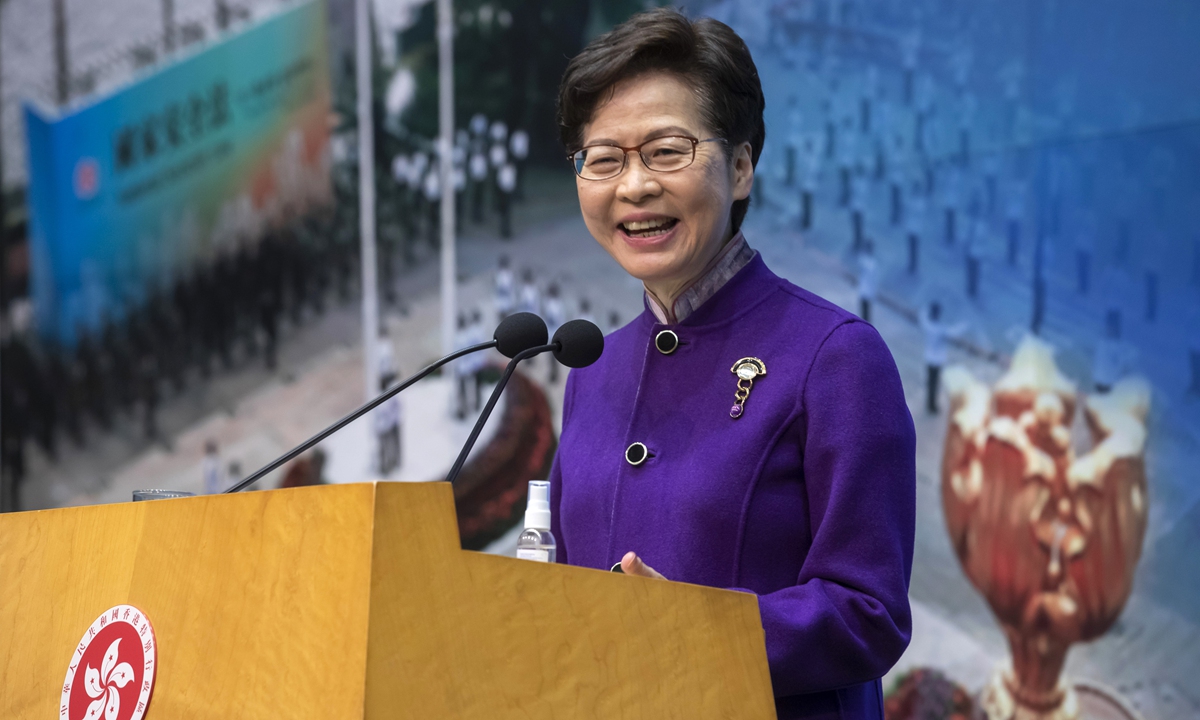
Carrie Lam, Hong Kong’s chief executive, speaks at a news conference in Hong Kong, on December 20, 2021 after the Legislative Council election in Hong Kong the previous day. Lam hopes to cooperate with the members of the new LegCo to build a better Hong Kong. Photo: VCG
Boost confidence in future
Carrie Lam, chief executive of the HKSAR, told the media on Monday that an election with the participation of 1.35 million voters is not an insignificant election as some media hyped, because it's an election with support from huge number of people.
She also stressed that "the number of registered voters reached a new height with 4.47 million Hong Kong residents registering, and this accounts for 92.5 percent of the qualified voters in the city."
According to TVB News, the newly elected lawmakers will take their oaths of office on January 3, 2022, and the chief executive will be the commissioner for the oaths. The regional emblem hung in the Chamber of the LegCo was replaced with the national emblem on Friday as part of preparations for the oath-taking after the LegCo election on Sunday.
Lam will pay a duty visit to Beijing from Monday to Thursday to "brief state leaders on the latest economic, social and political situation in Hong Kong," according to a press release on the HKSAR government's website on Monday.
This is the first duty visit by Lam to Beijing after 2019, as she delivered the 2020 work report via video link on January 27 early this year due to the impact of the COVID-19 pandemic, and some Hong Kong media said the arrangement is "unusual."
Li Xiaobing, an expert on Hong Kong, Macao and Taiwan studies at Nankai University, told the Global Times that key senior officials of the HKSAR need to stay in Hong Kong to make sure the election could be finished peacefully. So once the election is finished, they will be able to leave for the duty visit. So the timing is not that special.
The LegCo election has proven that the new electoral system is reliable and effective despite criticism from some Western media, as the result proves that the patriots-only principle has been fulfilled and there was no conflict to interrupt the election, Li said, stressing that this has boosted confidence in the country and the HKSAR.
"The successful conclusion of the LegCo election has laid a foundation for future elections, especially the chief executive election in 2022. Although the chief executive election and the LegCo election are very different, the LegCo election shows that the new electoral system could greatly improve the political environment of Hong Kong and social order, unlike the chaotic and intense situation in 2019. This is significant for the HKSAR to recover and march on the new path," Li said.


